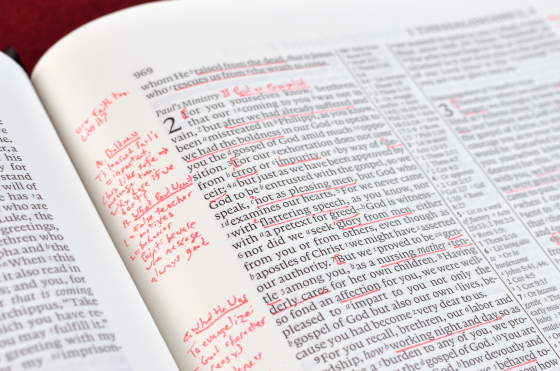Blog
“Should I Use One Bible for Everything?”
Categories: Meditations

Even though I’m out of the Bible-review business, the form of the word of God still fascinates me almost as much as its contents. As a result, it was with great interest that I read a post about Bibles from my friend and brother Ryan Boyer. Ryan argued that just as a police officer or other firearm-wielder ought to rely on one weapon, so that they can become completely familiar with all its characteristics and quirks, so too Christians ought to rely on one Bible.
There’s a lot that I like about Ryan’s argument. First of all, it’s emotionally powerful. Lots of Bible collectors are Bible collectors because they’ve spent decades searching for that one perfect Bible that does everything they want it to. Something inside us believes that we ought to have a one-and-only Bible, and I think it’s a mistake to ignore that voice.
Second, there’s much to be said for familiarity with a particular physical format. Barring some unusual circumstance, I do think it’s wise to make our primary Bible the Bible that we use for daily reading. An increasing number of studies have found that we better remember what we have read from a physical book as opposed to a screen. We are physical creatures, and reading out of a paper Bible is a physical act. The sensation of holding the Bible and manipulating the pages, plus seeing layout in a non-virtual space, helps us remember where passages are.
After having used dozens of Bibles during my Bible-reviewing days, I’ve settled on a primary Bible (a top-grain cowhide Crossway Large-Print Thinline Reference, not that I’m particular about covers or anything) and enjoy having a primary Bible. However, there are still circumstances in which I turn to a different Bible:
- I rarely-to-never bring my primary Bible home from the church building because I am absent-minded and will end up leaving it at home, which is unhelpful.
- When I'm studying with somebody who is a Biblical novice but wants to use a paper Bible, I will use a Bible with the same layout and page numbering as our giveaway Bibles (the Crossway Large-Print Value Thinline). That way, I can tell them, "Turn to Page 1152,” even if they don't know Genesis from Revelation. However, this Bible isn't a wonderful reading Bible for me (the lines are too short), and it doesn't have a lot of the helps I look for in a desk Bible.
- When I'm preparing a textual study of a book, my first step is to read the book out of my six-volume Crossway Reader's Bible. This Bible is optimized for reading and doesn't have chapter or verse numbers, so that I have an easier time following the flow of argument through the book. However, it's tough to preach out of a Bible with no chapter or verse numbers! Lack of chapter numbers also makes it difficult to use this Bible to keep either of my two reading schedules.
Ultimately, I believe (and I know Ryan would agree) that the word of God that matters most isn’t the word of God in our hands. It’s the word of God in our hearts. So far as I know, not one first-century Christian possessed a complete copy of the New Testament, but they managed just fine without it.
That same word still saves us today, and whatever method will best get it inside us, be it a top-grain cowhide Crossway Large-Print Thinline Reference, a different translation for each day of the week, or even an e-Bible on a smart phone, that’s the method we should use. What we are reading or studying can make a difference. That we are reading and studying makes all the difference in the world.





